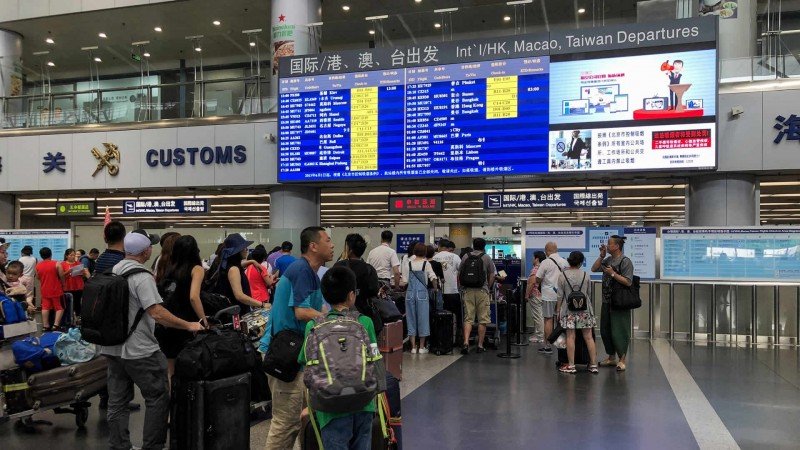China issues crackdown warning on cross-border gambling ahead of Chinese New Year

A few days ahead of the Chinese New Year holidays, mainland Chinese authorities have urged Chinese nationals who are involved in cross-border gambling activities to turn themselves in, according to a notice co-drafted by the Supreme People’s Court, the Supreme People’s Procuratorate and the Ministry of Public Security.
During a press conference Friday in Beijing, Liao Jinrong, director of the department of international cooperation of the Ministry of Public Security said: “The Ministry of Public Security attaches great importance to cross-border gambling and is prepared to crack it down. [It] will be on standby 24 hours a day, adopting a zero-tolerance attitude, and will always maintain a pressing attitude of the capital service platform, technical support platform, gambling personnel and fugitives."
“At the same time, it will work closely with the immigration department and other departments to strictly implement various immigration control measures, and strengthen law enforcement cooperation with relevant countries to effectively cut off overseas gambling groups from betting and gambling against Chinese citizens,” Jinrong added, as reported by Macau Daily Times.
The official also said that according to statistics in possession by mainland Chinese authority, Spring Festival holiday, the Chinese New Year, is the most rampant period of overseas gambling targeting mainland citizens. “It not only caused a large outflow of capital but also give rise to vicious crimes such as kidnapping, extortion,” Jinrong said. “All kinds of organizations and persons involved in cross-border gambling and in illegal and criminal activities are warned to immediately stop the illegal and criminal activities. […] The public security organs will severely crack it down."
The notice drafted by the Chinese authorities does not name any countries. According to the notice, mainland police authority is targeting gambling outside of China, particularly online gambling based outside of the country’s borders targeting mainland Chinese. Providing technological support and capital support to these overseas online gambling is considered by the mainland authorities as a violation of the law of mainland China.
The announcement follows several legislative changes imposed by the Chinese central government to tackle cross-border gambling promotion. China’s National People’s Congress recently passed an amendment to its criminal law that will, from 1 March 2021, create a new crime against cross-border casinos found to be organizing or soliciting Chinese citizens to gamble and increase penalties for those found guilty of serious breaches.
In August 2020, China established a blacklist system for cross-border gambling tourist destinations. The ministry and several relevant departments will impose travel restrictions on Chinese citizens heading to overseas cities and scenic spots on the list. In January this year, the Ministry of Culture and Tourism of China announced that China will add more overseas destinations to the blacklist.
Ge Wanjin, Director of the Macau Synthetic Social Studies Association has told local Chinese media that he believes that the blacklist targets southeast countries but not Macau and the blacklist will not have significant impact on Macau’s economy.
Impact on junket markets
According to analysts from Sanford C. Bernstein, these measures targeting cross-border gambling will further compound the local junket sector but a hit to mass and premium mass business is not expected.
"The area where Macau is impacted is via junkets that operate in both Macau and overseas and also when Chinese visitors in Macau are induced to join online gambling activity and/or approached to go to an overseas destination for future trips. These activities will be monitored and legal action taken in Macau," the brokerage stated in a recently published note, as reported by Macau News Agency.
Friday's notice highlighted that authorities would be taking action against individuals engaged in criminal activity tied to overseas gambling, with Bernstein believing it is also linked to the ‘rampant spread’ of illegal online gambling in China. "We believe several countries are targeted, including The Philippines, Cambodia and Myanmar. In addition, there is likely to be scrutiny of Laos, Vietnam, and other foreign gambling destinations (we do not believe Singapore is a target in this action partly due to the gaming industry there having strong regulation with regard to junkets and anti-money laundering," Bernstein added.
According to numbers cited by Bernstein, last year Chinese authorities disclosed that they had pursued some 3,500 cases and detained about 75,000 suspects amid a sweeping crackdown on cross-border and online gambling.
"Over 2,260 gambling platforms (we believe this refers to online gambling), as well as around 1,960 illegal payment platforms and underground banking operations were also shut down in 2020. Further, 600 Chinese nationals wanted for illegal gambling and money laundering-related activity were repatriated from overseas back to China during the year," the brokerage added in a note.
As for the most recent Ministry of Public Security statement, Bernstein analysts consider that the ministry crackdown will focus on junkets and agents, funders of these operations, and channels for moving money overseas.
"The bigger impact would be to junket VIP in Macau (~80%+ of rolling business in Macau), which is already under pressure due to liquidity concerns. Macau junket agents operate in China under the radar and their activity always fell into a shady grey area," Bernstein noted. The financial consultancy argued that with the current law changes and government actions, the junket system that has been in place, will undergo a fundamental change but it will not likely disappear completely.
"A continued shift to premium direct (direct VIP) and premium mass occurring in Macau will continue to accelerate as we have written about at length. Mass remains the key driver of long-term value creation in Macau," the brokerage added.
On Monday, a new gaming property, The Londoner Macao, opens on the Cotai Strip and the Chinese New Year holidays start on Thursday and last for around a week. China’s State Council has designated February 11 to 17 inclusive, as the Chinese New Year holiday period for this year. The week-long break is typically a busy period for Macau’s casino resorts and the local tourism trade. Last year alone, it drove over a million people to the city – around the time the novel coronavirus epidemic was made public and the first cases were detected in the SAR.

















































